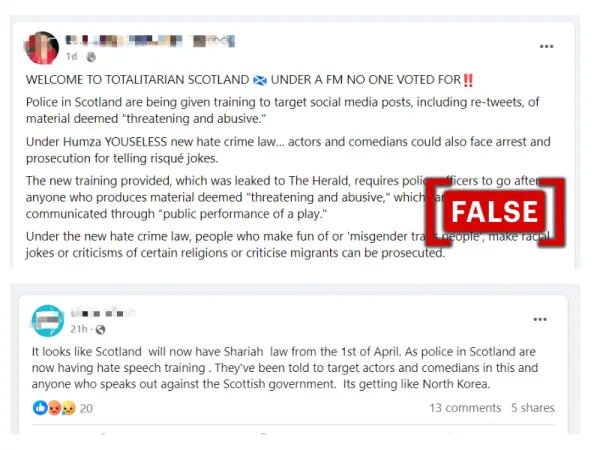By: Siri Christiansen
March 20 2024
No, Police Scotland has not been told to target actors and comedians under new hate crime law

Social media posts commenting on Scotland's new hate crime law. Source: Facebook/Screenshot (Modified by Logically Facts)
The Verdict False
Police Scotland’s training material does not explicitly instruct officers to target actors and comedians.
The claim
On March 19, Scottish newspaper The Herald published a front-page story titled "Police told to target comics under new hate crime law," pointing to training material provided to police officers in preparation for the country's new Hate Crime and Public Order law.
The Herald's story quickly became viral on social media by users such as right-wing blogger Ian Miles Cheong, who wrote on X that repeating a joke, showing someone "a spicy meme or commentary of a transgender person or mass migration on your livestream" could get you arrested under the new law.
Elon Musk subsequently shared Cheong's post, which has been viewed over 23 million times as of March 20.
The claim spread widely on Facebook, where users called the new law "totalitarian" and said it would target "anyone who speaks out against the Scottish government." Archived posts can be found here, here, and here.
The facts
The Herald article is real but does not include direct evidence proving that Police Scotland's training material explicitly instructs officers to target actors and comedians. The Herald's claim seems to be based on a section in the training material that lists examples of how threatening or abusive material can be communicated, such as "through public performances of a play."
X post with the front page of The Herald (Source: X)
The phrase "target" used in the headline could have been picked up from a quote by David Greig, the artistic director of the Royal Lyceum in Edinburgh, who has said – in response to the first draft of the bill, not to the training material – that "putting theatre in its own category makes it a target." The BBC, which has also seen parts of the training material, did not report that it contained explicit instructions to target any specific group, meaning it is more likely that this is an interpretation made by The Herald.
Police Scotland issued a clarification on March 19, saying it is "aware of inaccurate media reporting" about the training material and confirmed that "Police Scotland is not instructing officers to target actors, comedians, or any other people or groups."
In the statement, Police Scotland said the training material is based on the Scottish Government's explanatory notes to the legislation: "This included examples of a range of scenarios where offenses might take place, but this does not mean officers have been told to target these situations or locations."
Mark Walters, Professor of Criminal Law and Criminology at the University of Sussex and Co-Director of the International Network for Hate Studies, told Logically Facts that the "stirring up of racial hatred" has been outlawed since 1965 in the U.K. but that very few are prosecuted on such grounds.
"For example, between 2006 and 2016 there were just 9 cases under the laws on stirring up racial hatred," Walters said.
The Hate Crime And Public Order (Scotland) Act 2021, which comes into force in April, extends the existing provisions to a broader range of characteristics such as age, disability, sexual orientation, and transgender identity, he added – but the new provisions are stricter than those in place for stirring up racial hatred.
Among several things, the law uses the word "hatred," which is generally considered stronger than "prejudice," which is used in other hate crime provisions. Walters also highlighted that the prosecution must prove that the offender "intended" to stir up hatred, which he describes as "very difficult." Almost identical provisions for stirring up sexual orientation hatred were enacted in England and Wales in 2008, and a 2021 review by The Law Commission for England and Wales found no evidence that prosecutions interfered with freedom of expression.
"Not only does the prosecution have to show someone's words or behavior are 'threatening or abusive' and that they 'intended' to 'stir up hatred' they must then consider whether the words are considered to amount to 'discussion or criticism' of one of the protected characteristics," Walters said.
"A joke by a comedian is highly unlikely to ever meet these legal thresholds," he added. "They would have to intentionally use abusive and threatening language, and there would need to be evidence that they intended to stir up hatred – and even then, their freedom of expression rights would need to be considered before any prosecution would ever take place."
The verdict
This claim is based on a list of examples of how hateful material can be communicated. The Police Scotland training material published by The Herald and the BBC does not explicitly instruct officers to target actors and comedians. Therefore, we have rated this claim as false.


